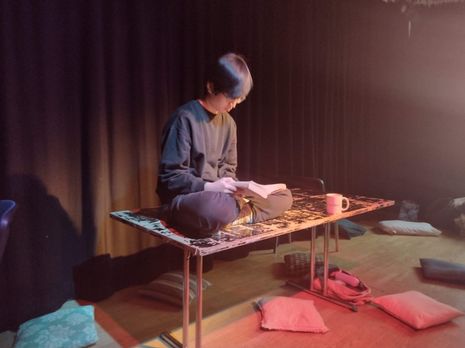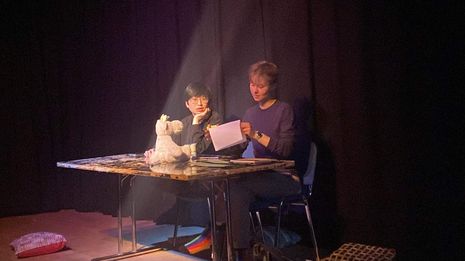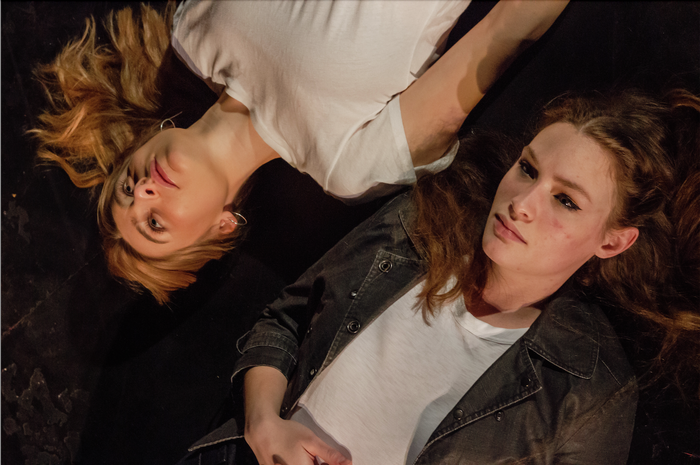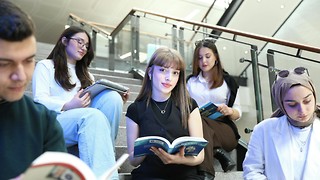Moderation deals in extremes
Theatre Editor Bethan Holloway-Strong reviews this award-winning student writing and ends up in an internet crisis
CN: this review contains references to memory loss and traumatic experiences in a theatrical production

This was quite the confronting play to see my first time in the Larkum Studio. A small room off of one of the corridors of the ADC, the Larkum (as it is affectionately known) was shrouded in oppressive black curtains, their thickness trying hard to insulate against outside noise. Although occasional snatches of music from the Footlights Spring Revue crept in, I was soon much too entranced in the play taking place in front of me to even notice. Dealing with issues of internet privacy, mental health, and trauma in a digital age, Moderation follows two ex-social media moderators forced to watch the worst content on the internet to deem whether it can be allowed on the platform. Reconnecting after years apart when one decides to sue the company that contracted them, the two characters, only named A (Emma Shen) and B (Val Gladkova), must dig through their traumatic past to build a legal case.
“The audience feel complicit in A and B’s suffering”
Moderation co-won the Cambridge Creatives Playwrighting Competition, judged by industry professionals, but it was its winning award in the CUADC Playwrighting Competition that guaranteed this Larkum run. In a claim that is no surprise to anyone, I (an amateur theatre reviewer) totally agree with these accolades. The writing was simply stellar. Rebekah King manages to make an hour of script feel like mere seconds with her expert blend of comedy and drama. Although I was sceptical of the absurdist humour at first, finding it a bit arresting, I eventually realised that it was a stroke of genius on King’s part. Her writing, especially when performed in the claustrophobic Larkum, made the audience feel complicit in A and B’s suffering, laughing along when we knew we weren’t supposed to. Under Jyothi Cross’ careful direction, King’s script came to glorious life. I wished that some moments allowed the text more room to breathe, but the movements of the actors were expertly directed, especially in such a small space.

Praise must, of course, go to both actors. The entire play was a conversation between A and B as they go over details for the case against their former employer, remembering the mistreatment they endured while reminiscing on the (admittedly few) bright spots. Although the beginning of the play felt stilted and over-acted at times, I can confidently chalk this up to opening night jitters: by the end of the play, both actors had relaxed into their roles and gave very moving and convincing performances. Shen’s portrayal of A, who has developed a condition where they can no longer touch the ground without it feeling like “hot coals” on their feet, was sensitive and gripping. A particularly standout moment was their portrayal of A’s horrible recurring nightmare, which sent shivers down my spine. Gladkova’s B was the perfect foil to Shen’s A: happy, lively, and using humour to cope with their memory loss as a result of a head injury. Although I felt his delivery sometimes a bit too chipper, I loved their moving moments of emotional support with A.
Both actors really came into their own, however, when parodying their former employer, Cruella. As they re-enacted their memories, both Shen and Gladkova took turns at embodying the patronising manager. Their performances were hilarious but also confronting: it was shocking to see these friends playing the woman who had traumatised them both. This was another excellent writing choice from King, and the performances from Shen and Gladkova really made me think about the complicity of internet users like myself in their predicament.
“The production team completely came into their own”
The production design was suitably minimalist. The set consisted only of pillows (so A could step safely on the ground), two chairs, and a rather scratched table. This design, evocative of a childhood bedroom and complete with B’s beloved soft toy as a prop, really brought home the disgusting content of the script for me. A saying “I miss thinking that most human beings were good” was made even more impactful by their childlike cross-legged position on the tabletop. Sandra Karakas’ lighting design was nothing short of genius. The subtle lighting changes separated the memory scenes from the main storyline excellently, and the sudden washes of shocking reds gave me goosebumps. Nessa Lam also did an amazing job with the sound design, which included high-frequency sounds that perfectly captured the employees’ emotional distress. Faced with the somewhat challenging small space of the Larkum, the production team completely came into their own.
This is one of the most thought-provoking productions I have seen in Cambridge. I came out of the studio staring down at my phone, wondering how much I had contributed to the true story behind this script. After this, I’ll be looking at the ADC programmes more closely and seeing what’s playing in the Larkum. If it’s anything as good as this, I’ll definitely be back.
Moderation is playing in the ADC Theatre’s Larkum Studio at 20:00 until the 5th of March.
 Comment / The (Dys)functions of student politics at Cambridge19 January 2026
Comment / The (Dys)functions of student politics at Cambridge19 January 2026 News / Local business in trademark battle with Uni over use of ‘Cambridge’17 January 2026
News / Local business in trademark battle with Uni over use of ‘Cambridge’17 January 2026 Features / Exploring Cambridge’s past, present, and future18 January 2026
Features / Exploring Cambridge’s past, present, and future18 January 2026 News / Your Party protesters rally against US action in Venezuela19 January 2026
News / Your Party protesters rally against US action in Venezuela19 January 2026 Lifestyle / Seoul food19 January 2026
Lifestyle / Seoul food19 January 2026







